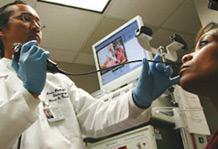Summary
There's been a dentist in Lingen's family since 1894, including his father, who still practices dentistry in Chicago. Over the past few years, promising new oral cancer screening devices have been marketed to his father and other dentists.
As a cancer researcher as well as a dentist, Lingen wants to determine whether these devices actually help detect precancerous and/or cancerous lesions. "A rigorous evaluation of these devices would inform dental and medical professionals, third-party payers and the public regarding their value, cost effectiveness and appropriate use," he said.
The randomized controlled clinical trial will compare the diagnostic accuracy of three screening regiments: conventional oral and tactile exam; conventional exam plus the Velscope; and conventional exam plus the Trimara OCS 3000.
These handheld devices use fluorescence to detect changes in tissue and cost $3,000-$5,000. For his trial, Lingen chose two that appear to improve cancer detection when used by specialists. He plans to see whether the same is true for primary care providers, something that has never been tested.
"This trial will be particularly informative because it will be conducted both with patients in communities disproportionately affected by oral cancer and with patients similar to those found in private dental practices, who are less likely to develop oral cancer."
Head and neck cancer is the sixth most common cancer in the world. Most cases are discovered late, and treating an advanced case can cost $250,000. "By catching pre-malignant and/or malignant lesions early, you not only improve morbidity and morality, but you save money," Lingen said.
This grant will cover the cost of planning and designing the rigorous trial. Lingen plans to apply for another NIH grant to cover the cost of conducting the trial. If funded, the trial would last five to ten years but yield some definite, long-lasting results.
by Greg Borzo
This award is funded under the American Recovery and Reinvestment Act of 2009, NIH Award number: 1RC1HD063610-01. For more information on NIH’s Recovery Act projects, visit .

 Ultrathin but super strong
Ultrathin but super strong
 Addressing Health Disparities
Addressing Health Disparities
 A new way to fight transplant rejection
A new way to fight transplant rejection
 Building a better mouse model
Building a better mouse model
 Testing tools that detect head/neck cancer
Testing tools that detect head/neck cancer
 New equipment opens up the world
New equipment opens up the world
 Tracking climate change by studying solar radiation
Tracking climate change by studying solar radiation

